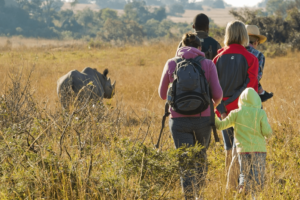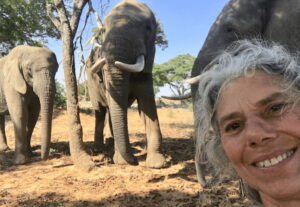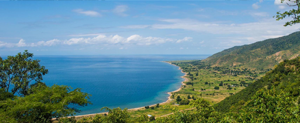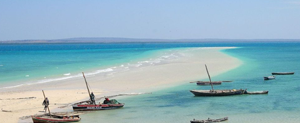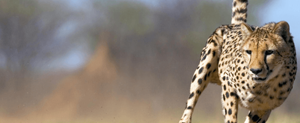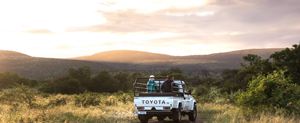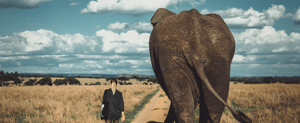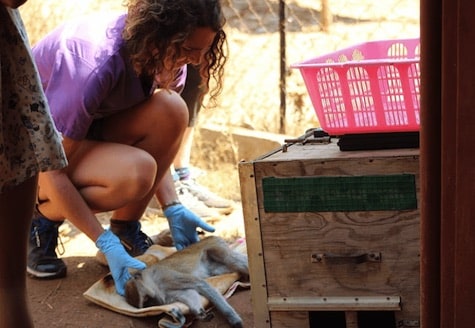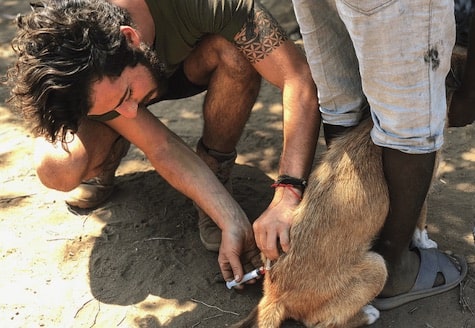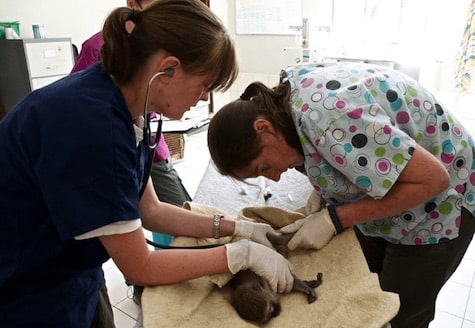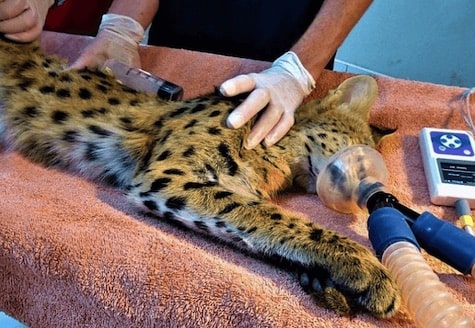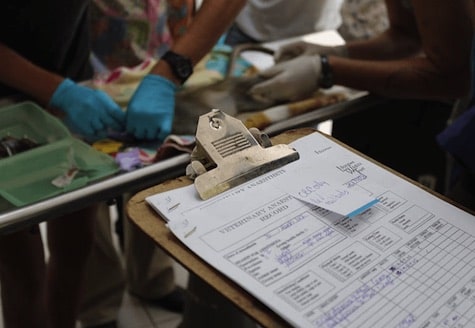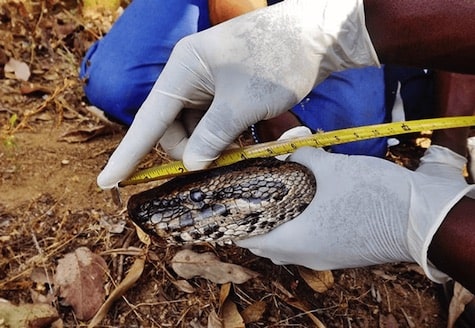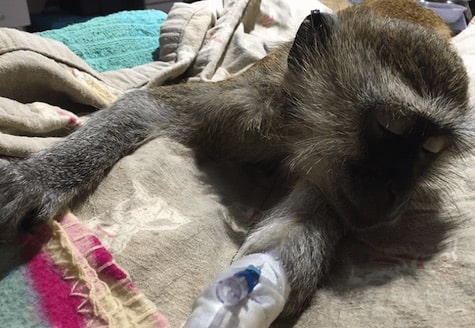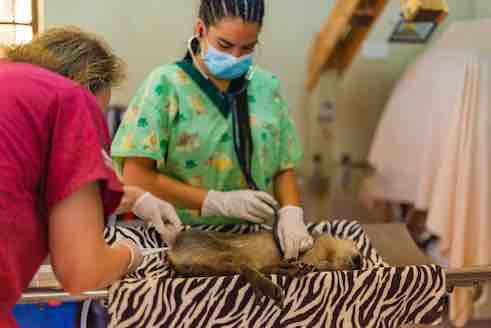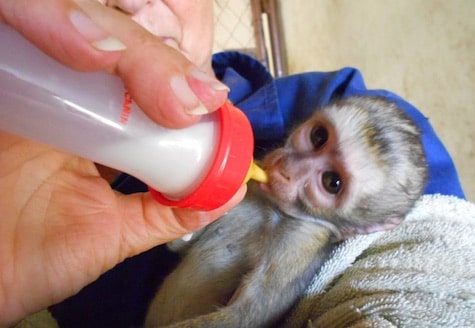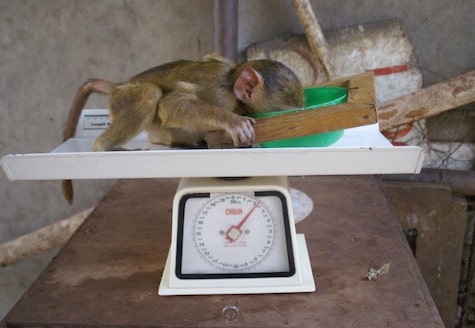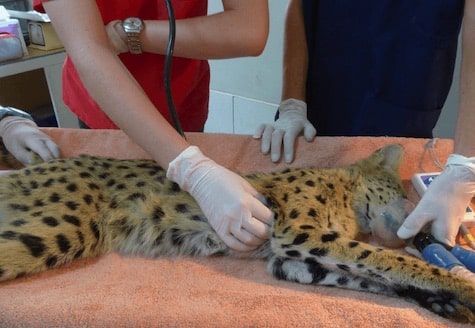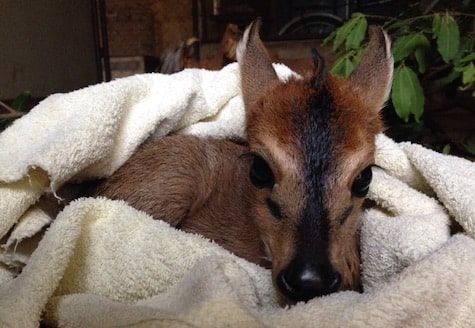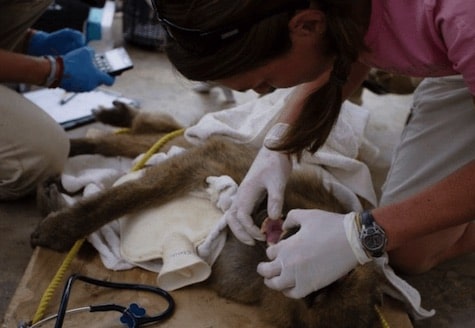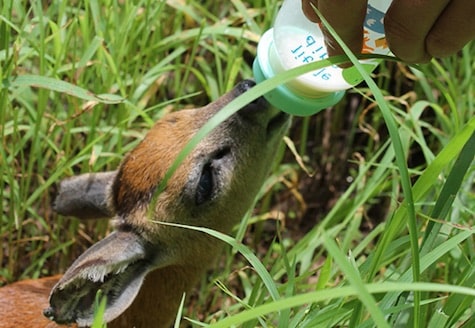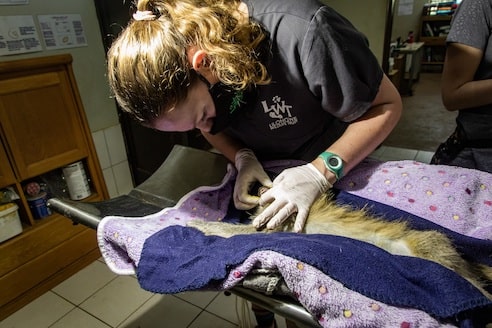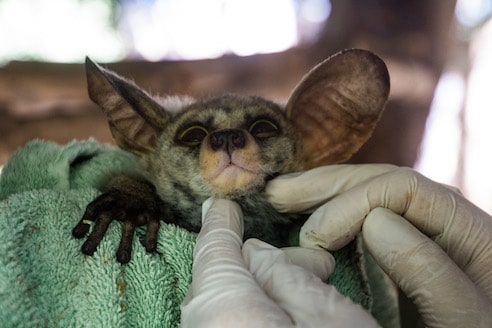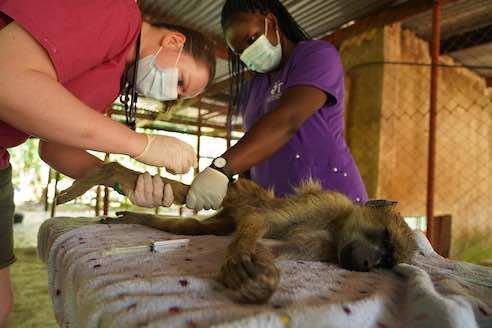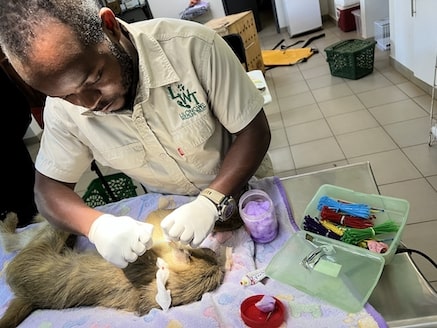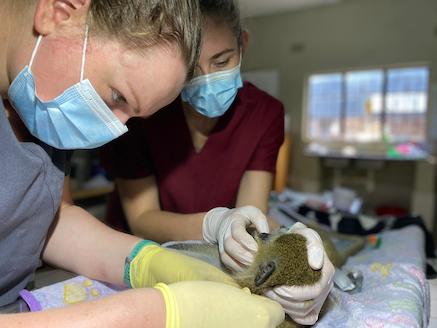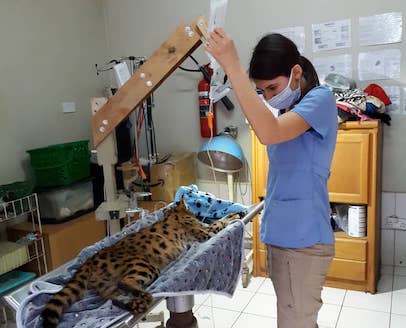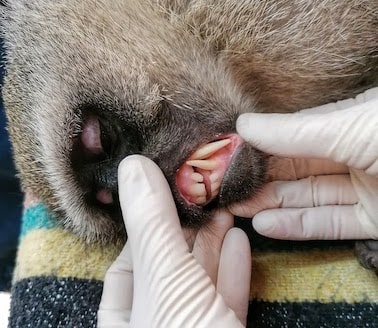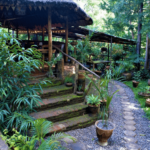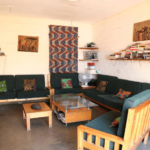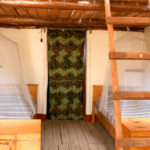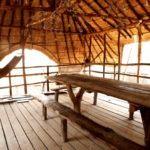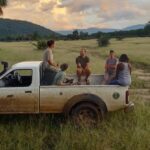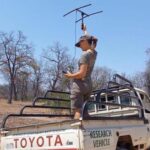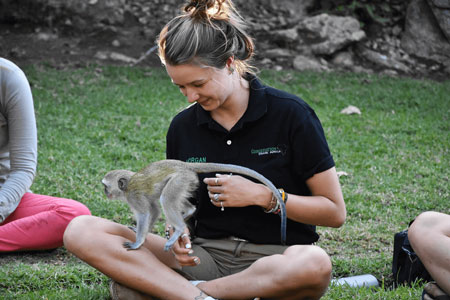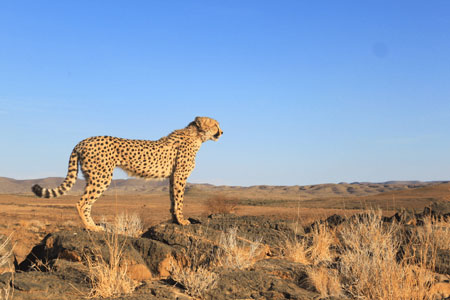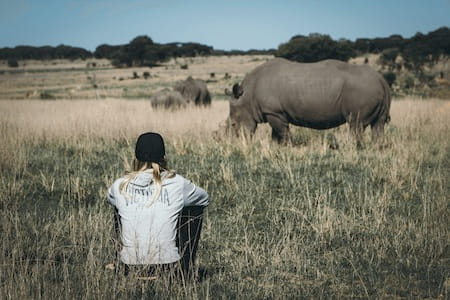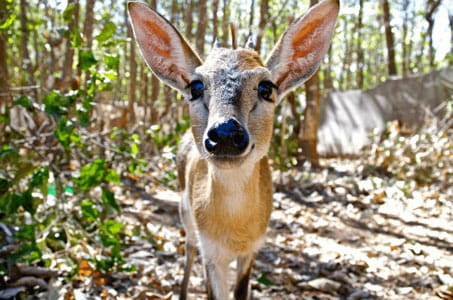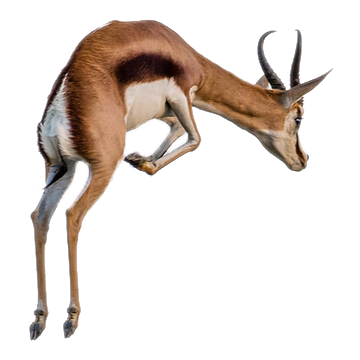Veterinary Internship
MALAWI
Malawi
2 - 12 weeks
Tuesday
6 interns
Age 18+
From £1,500
Malawi
2 - 12 weeks
Tuesday
Tues
6 interns
6 interns
Age 18+
From £1,500
What's the project about?
The wildlife centre is Malawi’s only animal sanctuary, with a focus on rescue and rehabilitation. Working alongside a resident team of expert wildlife vets, participants on the veterinary internship have a unique opportunity to gain work experience in animal care and nursing and learn new skills from qualified local staff. Animal care work will encompass the whole rehabilitation spectrum, from rescue, examination, ongoing supervision and final release.
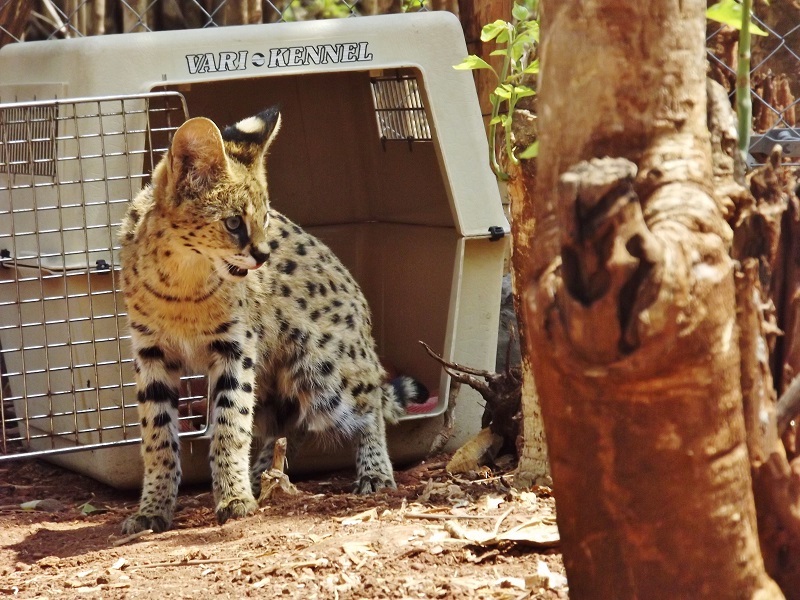
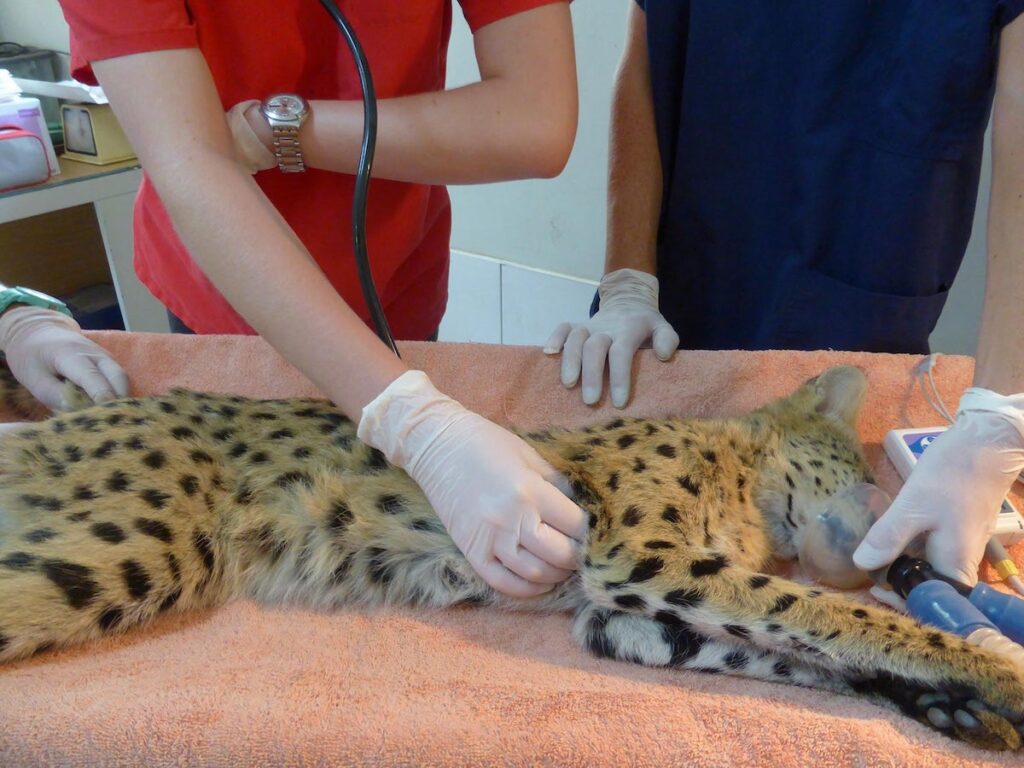
How will I be contributing?
Veterinary interns assist the on-site veterinarian when any clinical work arises, including incoming examinations of new arrivals, treatment of minor trauma, ongoing health checks and routine diagnostics. Get to grips with the wild side of veterinary science as you assist with the treatment of some unusual wild animals! Interns will also join sanctuary volunteers with general animal husbandry duties and animal reintegrations.
What makes this project ethical?
Join an organisation internationally recognised for its work to protect Malawi’s wildlife. Then sanctuary is focused on wildlife rescue and rehabilitation, and is widely regarded as being one of the best facilities in Africa for responsible wildlife care and rehabilitation. You can be confident that your veterinary internship is part of an ethical, high impact project, where you will learn best practices from highly qualified conservation and veterinary experts.
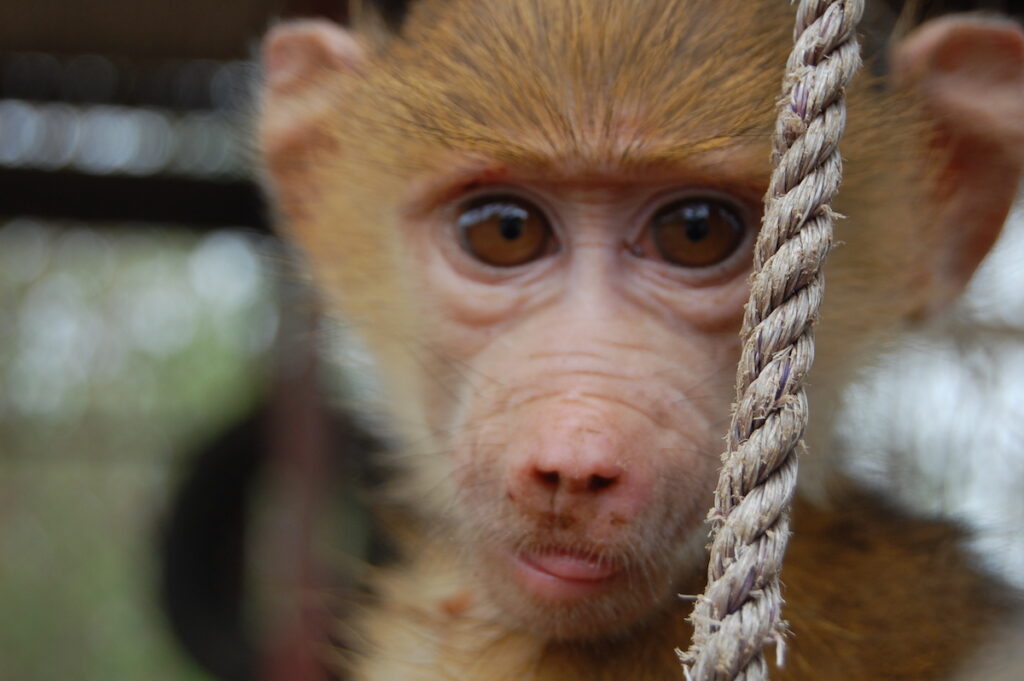
Project gallery
Project information
Get involved in a wide range of veterinary activities and assist with clinical health checks, diagnostics and outreach veterinary work. This programme is ideal for those looking to gain broad, real-world experience of sanctuary-based vet work that also includes other aspects of animal rehabilitation, as per the responsibilities of the sanctuary volunteer.
The sanctuary has the capacity to care for around 200 animals at any time, including primates, large and small carnivores, antelopes, reptiles and birds. Most of these wild animals have been orphaned, injured or affected by the illegal wildlife trade. The sanctuary team provides expert veterinary treatment and rehabilitation to give every animal a second chance at life in the wild. They release as many animals as possible into safe, protected wild habitats. Animals that can’t be released for medical or behavioural reasons find a long-term home in the sanctuary’s large, natural enclosures.
Hands-off wildlife policy
The sanctuary operates a strict hands-off policy, to give animals the best chance of release and continued life in their natural habitats. However, orphans and juveniles do need special attention until they enter the second phase of the rehabilitation and release programme, so you may well be put to use in orphan care work and providing initial care to younger animals.
Note that during periods of quieter veterinary activity, interns will join wildlife sanctuary volunteers in their daily activities.
Veterinary support:
Vet interns assist the on-site veterinarian when clinical work arises. All veterinary activities will be under the supervision of an experienced local veterinarian. This work may include:
- Incoming exams, minor trauma and routine diagnostics
- Assist the on-site vet in basic surgical procedures on all sorts of animals from hedgehogs to pangolins and barn owls!
- Assist with vaccinations and health checks for new arrivals
- Learn from experts in wildlife veterinary science
- Orphan care including feeding and possibly hand rearing
- Observe sick and injured wildlife
- Rehabilitation including integrations and observations
Please note that veterinary work may not be everyday, and when there is no clinical work to be done, interns will participate in the Centre’s other on-site animal care work. Animal care activities will depend on what animals and orphans are at the sanctuary at the time.
Animal care:
Volunteers play an essential role in the daily care of the sanctuary’s animals and may get involved with some or all of the following activities:
- Prepare meals for animals on a daily basis, and feed during the day (and night!);
- Learn about successful rehabilitation and release methods;
- Clean out enclosures and feeding pens;
- Help settle newly rescued animals into groups or into their rehabilitation enclosures;
- Quietly observe sick, distressed and injured wildlife who need close monitoring;
- Orphaned babies may also need intensive care such as bottle feeding, observation and interaction.
Note that animal care activities will depend on what animals and orphans are at the sanctuary at the time.
Behaviour and habitat enrichment:
A critical vet intern role outside of clinical work is to enrich the lives of the animals who cannot be released, enable them to live as natural a life as possible and behave as closely as they would in the wild. Volunteer-led enrichment helps to prevent the onset of stress behaviour by keeping animals stimulated. Enrichment can also help animals to practice wild behaviours like hunting and foraging.
- Build activity centres for animals (e.g. primates) to enable them to run, jump and climb;
- Make toys for animals to stimulate foraging;
- Observe and record animal interactions with the enrichment items;
- Work with animals who are not current candidates for release due to mental or physical issues.
Rehabilitation and release:
Releases done by the sanctuary have been highly acclaimed, thanks to the expertise and effort which goes into the rehabilitation process and subsequent release. Volunteers and interns are crucial to this process from rehabilitation, through monitoring and subsequent release.
- Help with pre-release monitoring to ensure animals are fit to be released;
- Settle new arrivals and rehabilitated animals into new groups and monitor their progress.
Activities around the sanctuary and game reserve:
- Monitor free-roaming animals within the 70-hectare reserve;
- Build and repair enclosures and fences;
- Dig new waterholes, build and maintain roads and paths, make signs and other building work around the sanctuary.
The Malawi Wildlife Sanctuary Programme page has more details about life on the project when you are not doing specific veterinary work.
Wildlife Veterinary Medicine Course dates: 19th August – 2nd September 2024.
Open to: students currently studying Veterinary Medicine or a vet-related qualification.
Location: Lilongwe, Malawi.
Read more about the course here.
Course overview: this two-week wildlife vet course is designed to give you a hands-on introduction to veterinary medicine in Malawi, with a focus on wildlife, including primates, and other animals such as dogs and possibly donkeys and/or farm animals. You will be taught by veterinarians from two of Malawi’s leading animal welfare organizations and will be taught though both lectures and wet labs.
Wildlife Vet Medicine Course Details:
Wildlife section:
Under the instruction of the veterinary team, you’ll have a chance to learn about parasitology, haematology, primate infectious and non-infectious diseases, emergency management, rehabilitation, pharmacology, medication, suture patterns in wildlife, remote capture systems, and key conservation issues.
You’ll assist with the project’s annual health monitoring programme for primates, which includes physical exams, patient monitoring, and sample collection and analysis.
Dogs/companion animals/ larger domestic animals:
The SPCA field clinics are a dynamic and hands-on opportunity for you to gain practical experience in companion animal surgery and anesthesia. You will actively participate in the anesthesia and surgical procedures, under the close supervision of the experienced veterinarians and nursing team. This hands-on experience will allow you to learn proper surgical techniques, through observation, assisting, and performing the surgeries yourself as you gain confidence and proficiency as well as learning how to administer and monitor anesthesia in a field setting.
In addition to spaying and neuter surgeries, the field clinics are a great opportunity to provide primary care to sick animals presented. Cases are varied and you may have the opportunity to encounter a variety of cases, such as transmissible venereal tumors, babesiosis, and distemper to name a few.
Accommodation details: you will sleep in the newly built volunteer house which accommodates 17 people in six rooms with single beds sleeping either two, three or four per room. There is a fully equipped kitchen, indoor and outdoor dining areas, a large living room and separate gender bathroom facilities.
Meals: all meals served will be vegetarian. Any special dietary requirements should be communicated to us at time of booking.
Price: £1,800 GBP per person
Price includes: accommodation, vegetarian meals, unlimited water, tea and coffee, airport transfers from Lilongwe, all work-related transport, course activities, a local SIM card, two T-shirts and a surgical cap.
All other expenses will be your responsibility. This includes: flights, visas, vaccinations, a TB scan, and any excursions, souvenirs, nights outs, snacks and other personal expenses you might have.
When can I volunteer?
Arrivals for the Veterinary Internship are on Tuesdays, although arrivals outside of these days are possible upon payment of a transfer supplement. The project is open year-round.
Project pricing:
2 weeks: £1,500
3 weeks: £1,942
4 weeks: £2,445
5 weeks: £2,817
6 weeks: £3,155
7 weeks: £3,477
8 weeks: £3,769
9 weeks: £4,044
10 weeks: £4,287
11 weeks: £4,527
12 weeks: £4,744
All prices are in GBP.
Feedback from volunteers suggests that a 2 week programme is just not long enough to experience the project to its fullest. We highly recommend a minimum 4-6 week stay if possible!
What’s included in the cost?
- Project contribution: this goes directly to our project partner, and provides funding to ensure the programme can continue to meet its goals. For this project it will cover things like staff costs, equipment purchases, maintenance of buildings, equipment and vehicles, veterinary fees, animal feed, fencing, funding for community projects etc.
- Accommodation and three meals per day.
- Return airport transfers (Tuesdays)
- Volunteer t-shirt and local SIM card.
- Comprehensive orientation and supervision.
- Practical instruction by experienced staff members.
- Equipment and materials required to do your work.
What’s not included?
- Flights or travel to Lilongwe, Malawi.
- Visa fees (if applicable).
- Travel insurance (compulsory).
- Personal expenses such as souvenirs, drinks, snacks.
- Additional excursions.
- Administration fee (£40).
View our booking terms and conditions.
Veterinary interns live in the heart of the wildlife sanctuary, which means that you’ll experience the magic of bush life after a hard day or work – spending evenings by the fire listening to the sounds of the forest.
The on-site accommodation building can host up to 17 people (interns and sanctuary volunteers) at a time across six bedrooms. It also includes a lounge, kitchen, inside and outside dining spaces, two bathrooms, laundry space, an outdoor deck and garden.
The house has electricity and hot and cold running water. There is a housekeeper who will do your laundry for you as well.
Meals are cooked by the local Malawian chef every day except on Sunday. The menu is vegetarian with a mix of international and local dishes. Special dietary requirements can be catered for and volunteers are welcome to buy in other luxuries or meat if they wish.
Volunteers will be issued a Malawian SIM card upon arrival, and you can then purchase data bundles for using the internet. There is Wi-Fi at the volunteer house.
The project has a research site in the heart of beautiful Liwonde National Park, home to large populations of elephants, rhinos, lions, cheetahs and plains game. Volunteers have the opportunity to spend a week or more monitoring species of special concern in the Park. You’ll work with iconic species such as lions and cheetahs, collecting data that will directly inform conservation strategies.
Volunteers participating in the programme in Liwonde will improve their conservation knowledge and develop practical research skills. You will not only have the opportunity to spend time out in the field learning new skills, but also contribute to research that makes a real difference to the knowledge and health of Malawi’s key animal populations.
Who should join?
No specific skills are required, just an interest in field research and amazing wildlife!
What activities will I be doing?
Activities include
- Radio tracking of targeted animals
- Checking camera traps
- Recording opportunistic sightings.
- VHF radio tracking
- Animal identification
- Data entry.
You’ll also experience some truly unique moments as you learn more about the dynamics of animal groups and individual wild animals during your placement. This may include moments such as witnessing the take-over of a pride by a new male, watching a female cheetah teaching her cubs how to hunt or observing the dynamics between vultures and mammalian predators at a carcass.
How much does it cost?
Fees for the Wildlife Research Programme are the same as the Veterinary Internship.
Click for more details of our Wildlife Research & Monitoring Programme and see the Rates and Dates tab for pricing details.
For the latest travel updates, please visit our Malawi destination page.
Who can join the Veterinary Internship?
The vet intern placements in Malawi are aimed at vet students who have completed at least one year of veterinary school. Please enquire if you have not yet started or completed your first year of vet school. If you are on a pre-vet course or have yet to start a veterinary degree, you may join the Malawi Wildlife Sanctuary project and they will endeavour to give you priority on clinic observations during your time there.
You must be able to communicate well in spoken English.
How old do I need to be?
The minimum volunteering age for solo travellers is 18 years. There is no upper age limit.
How many people will there be?
Six veterinary placements are available.
When can I join?
Interns should aim to arrive and depart on a Tuesday, although start dates can sometimes be flexible depending on availability and the payment of a transfer supplement. The project is open year-round.
When is the best time to come?
Lilongwe has a temperate climate for Africa. Wet season is from November/December to February/March, but it is actually very pleasant as rains last only an hour or so in the afternoons and make the country lush and green! Temperatures reach around 32 degrees in the hot months of October and November, and the coolest month is July, at around 25 degrees, but still bright and sunny.
Do I get some time off?
Interns are kept very busy during their stay on the project and you will work 6 days a week from 8am until 5pm. Most orphans need feeding through anti-social hours and some may need round-the-clock care. Volunteers should try and be flexible with their working hours as some will be required to take night shift duty with injured and orphaned animals. Volunteers staying more than four weeks will be given a long weekend off each month (if you want!).
Lilongwe is a clean, quiet and safe African city with just the right amount of nightlife and restaurants, which you are more then welcome to visit! There are craft and food markets within walking distance for buying curios and haggling for vegetables!
What excursions can I join?
It is well worth considering spending some time either before or after your programme exploring Malawi. Car hire is very affordable, and Lake Malawi is a short drive away, where you can swim, snorkel and relax on the beach!
An excursion into the stunning South Luangwa National Park in Zambia makes the perfect ending to your African adventure! These excursions can be booked when you are at the programme, or please ask for details of our recommended travel agent.
How long can I volunteer for?
The minimum length for the veterinary internship is two weeks, and the maximum stay is three months. Please enquire if you would like to stay longer than three months.
How much spending money should I bring?
We recommend allowing £50 per week to cover personal expenses such as drinks, souvenirs, snacks, tips and internet usage. There are ATM machines at the airport and we suggest you withdraw cash there for your time at the sanctuary.
Do I need a visa?
Most nationalities can obtain a tourist visa upon arrival into Lilongwe. The cost of this is usually around $50 payable in cash. It is your responsibility to check your visa eligibility prior to arrival.
What animals will I encounter?
The sanctuary is home to almost 200 animals at any given time. The types of animals that are rescued at the sanctuary can include monkeys, baboons, antelopes, hyenas, serval cats and other small carnivores, reptiles and birds. The sanctuary does not have the space to care for large animals such as lions, elephants or rhinos.
Please note that activities will vary according to what animals are at the project at the time and what their needs are. Be flexible and bear in mind that the variety and number of animals can change daily. The only thing we can guarantee is that you will have an amazing time!
Can I touch the animals?
The goal of the sanctuary is to release as many animals as possible back into the wild. It is very important not to habituate or humanise the animals, as this puts them at greater risk of poaching or capture after their release. With that in mind, the sanctuary operates a hands-off policy. Some orphans will need special attention and round-the-clock care to promote their chances of survival and rehabilitation, and in these cases volunteers may be asked to step in as surrogates. It is an especially rewarding experience to see animals progress and know that you have helped them journey back to health and release.
What vaccinations do I need?
A rabies vaccination is compulsory as you will be working closely with animals. You must also undertake a TB test prior to travel. Even if you have been vaccinated against TB, you must take a new one for this project. A Mantoux test, blood test or chest x-ray is most appropriate. You must email your TB-negative test to the project and carry the results with you. Lilongwe is regarded as high-risk malaria areas, so anti-malarial prophylaxis must be taken. Consult your GP or travel clinic for further detailed medical advice. All volunteers should make sure their Tetanus booster is up to date. You must bring your vaccination certificates with you!
Please visit this UK government website for more details.
Support a high-impact organisation
The project started off as just a wildlife sanctuary but has grown to span wildlife rescue (of large and small animals), animal welfare, education, advocacy, justice and research. Trust staff work with local community leaders, wildlife departments and law enforcement agencies and plays a role in Malawi’s fight to protect its wildlife and habitats.
Hands-off for the best care
The sanctuary can care for around 200 animals at any given time, including primates, small carnivores, antelopes, reptiles and birds. Most will have been rescued as orphans or been victims of the illegal bushmeat and pet trade, others have been injured in snares, hit by cars or stoned by local villagers. Thanks to the state-of-the-art vet clinic, orphan care programme, experienced animal care team and dedicated volunteers, the majority of intakes can be managed on-site.
Whilst the sanctuary operates a strict hands-off policy, orphans and juveniles do need special attention so there is a chance you will be put to use in surrogacy work and providing initial care to younger animals until they enter the second phase of the rehabilitation and release programme.
The veterinary internship teaches best practices in veterinary care and animal rehabilitation, allowing interns to acquire new skills and gain practical experience.
Conserve Malawi’s wildlife heritage
Malawi’s wildlife and biodiversity face a number of threats, with habitat loss being one of the most serious. Wild animals are sometimes illegally kept or traded as pets, hunted for their meat, skin or scales, or injured through human-wildlife conflict. Environmental decline in Malawi has been hastened by rapid population growth, high poverty levels and a changing climate.
Be part of the bigger picture
However, Malawi is in the grip of a conservation revolution. In recent years, the Government has clamped down on wildlife criminals by passing tough laws and disrupting organised crime syndicates. Greater investment in protected areas has led to a boom in wildlife populations and the return to some areas of the ‘Big Five’.
Veterinary interns work directly with animals rescued from the bushmeat and exotic pet trades and become part of human-wildlife conflict resolution.
Volunteer reviews



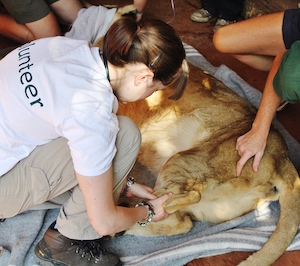
Other projects you might be interested in
Volunteer at Zimbabwe’s only dedicated primate rehabilitation centre. Gain animal care experience and assist in wildlife rehabilitation and release.
From $875
1 - 12 weeks
Support the conservation of big cats in a responsible way and help mitigate the human-wildlife conflict. Track wild carnivores in a spectacular setting.
From $1,600
2 - 12 weeks
Join a unique conservation programme, dedicated to the protection of the black rhino. Play a vital role in securing the future of these iconic animals.
From $950
1 - 12 weeks
Get involved with behaviour and habitat enrichment, wildlife rehabilitation, orphan care and health checks at this small sanctuary project in Malawi.

